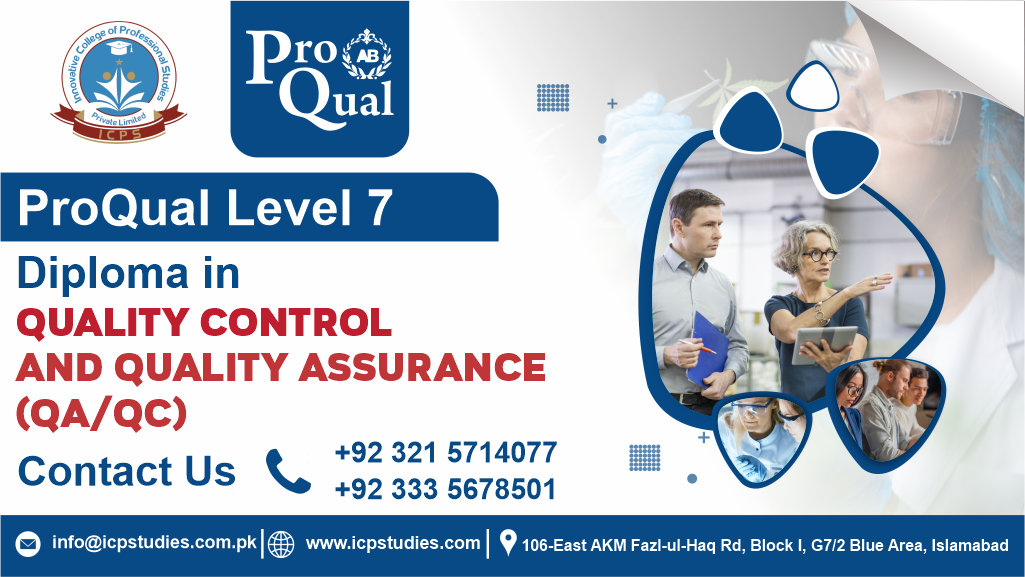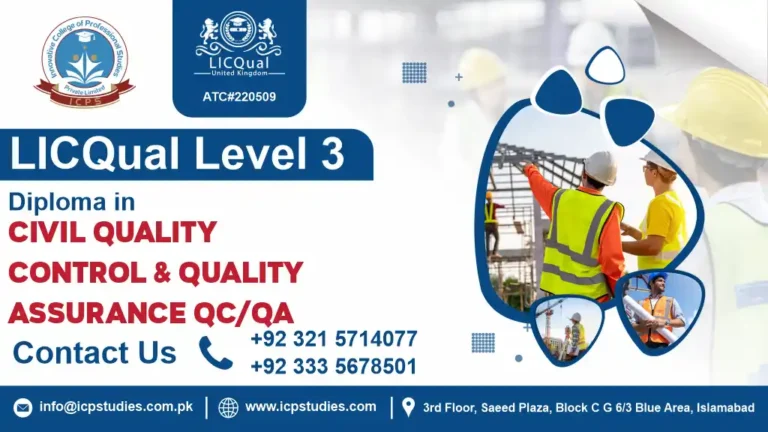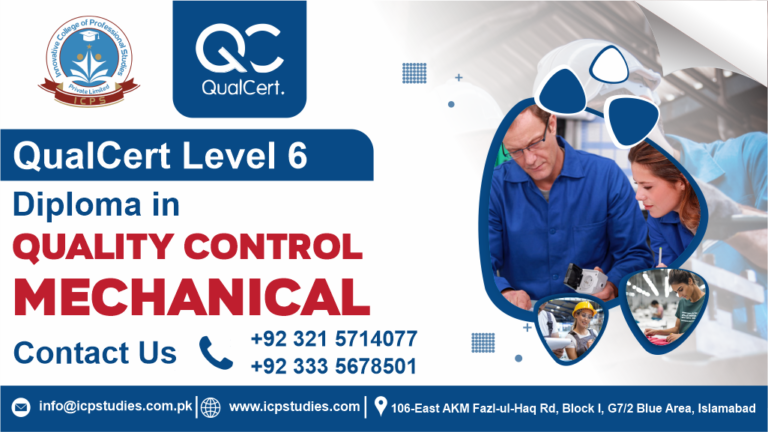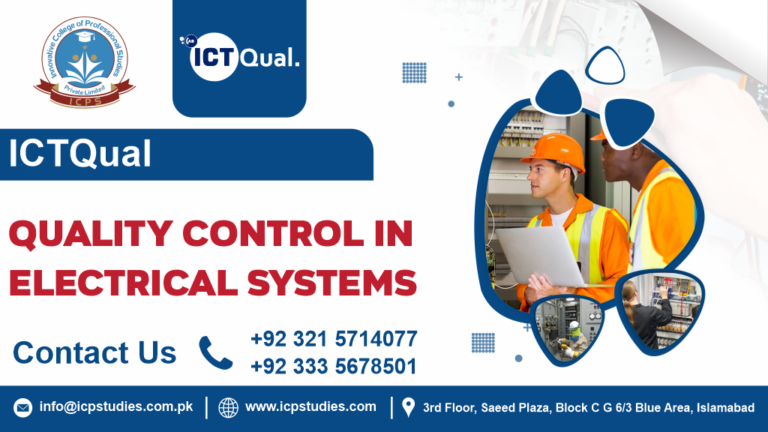Are you looking to enhance your expertise in quality control and assurance within the industry? The ProQual Level 7 Diploma in Quality Control & Quality Assurance is a specialized, advanced qualification designed to equip professionals with the skills and knowledge required to excel in quality management roles. In this blog post, we will provide an in-depth overview of this prestigious course, its learning outcomes, study units, benefits, and who should pursue this certification.
The ProQual Level 7 Diploma in Quality Control & Quality Assurance is a nationally recognized qualification aimed at professionals who wish to develop their expertise in quality control, assurance, and management systems. This diploma is designed for individuals who are already working in or seeking to work in roles that demand a high level of understanding and competence in managing the quality of products and services within various industries.
The ProQual Level 7 Diploma in Quality Control & Quality Assurance is a high-quality qualification that provides the knowledge and skills needed to excel in the field of quality management. Whether you are aiming for a leadership role or want to enhance your expertise in quality control and assurance processes, this course is designed to help you achieve your career goals. The course offers valuable industry insights, flexible study options, and a pathway to professional success in quality management across diverse sectors.
Ready to take your quality assurance career to the next level? The ProQual Level 7 Diploma could be the ideal next step in your professional development.
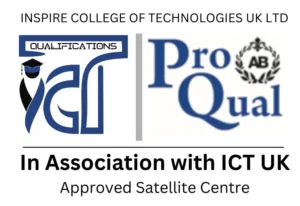
Innovative College of Professional Studies (Private) Limited (ICPS) is offering ProQual Qualifications in association with Inspire College of Technologies (ICTQual)
All About ProQual Level 7 Diploma in Quality Control & Quality Assurance
Course Overview
The ProQual Level 7 Diploma in Quality Control & Quality Assurance is a prestigious, advanced-level qualification designed for professionals who wish to deepen their expertise in quality management practices. This course provides a comprehensive understanding of quality control, assurance processes, and management systems, focusing on key industry practices and methodologies that drive quality excellence.
Ideal for individuals working in or aspiring to senior roles in quality assurance and control, this diploma equips you with the strategic, technical, and leadership skills necessary to implement, monitor, and improve quality management systems across a wide range of sectors, including manufacturing, engineering, healthcare, and services. By undertaking this course, you will gain the tools and knowledge to lead quality initiatives, manage risk, and contribute to the continual improvement of products and services.
With a flexible learning approach, the ProQual Level 7 Diploma allows you to develop critical skills that will enhance your career prospects and enable you to take on high-level responsibilities in quality management and leadership positions.
Study Units
| Strategic Quality Management Advanced Quality Auditing and Inspection Techniques Statistical Methods for Quality Control Lean Six Sigma and Process Optimisation Advanced Quality Management Systems (QMS) Supplier Quality Management and Control Strategic Quality Management Regulatory Compliance and Standards in QA/QC Research and Development in Quality Control |
The ProQual Level 7 Diploma in Quality Control & Quality Assurance is an advanced qualification, designed for individuals with a solid foundation in quality management or a related field. While specific entry requirements may vary depending on the learning provider, the general requirements include:
- Relevant Work Experience:
- Candidates should have a minimum of 3-5 years of professional experience in a quality management, quality control, or assurance role. This experience will ensure you have a solid understanding of the industry and the practical applications of quality management systems.
- Educational Background:
- A bachelor’s degree in a relevant field (e.g., engineering, business, management, or any technical discipline) is generally preferred. However, individuals without a formal degree may still be considered if they have substantial relevant experience in quality management.
- Understanding of Quality Management Principles:
- A working knowledge of basic quality control and assurance principles, such as ISO standards, quality audits, and process improvement methodologies, is beneficial. This can be demonstrated through prior qualifications or professional experience.
- English Language Proficiency:
- As the course content will be delivered in English, candidates must possess sufficient proficiency in the language to engage with the material, participate in discussions, and complete assessments effectively.
- Commitment to Professional Development:
- The course requires a high level of commitment to self-directed learning, research, and practical application of concepts in your professional role.
If you meet these requirements, you’ll be well-equipped to tackle the challenges and in-depth subject matter covered in the ProQual Level 7 Diploma in Quality Control & Quality Assurance. However, it is always advisable to check with your chosen learning provider for specific entry criteria and any additional requirements that may apply.
he ProQual Level 7 Diploma in Quality Control & Quality Assurance is ideal for professionals who are looking to advance their careers in quality management and assurance. This course is specifically designed for individuals who have experience in quality-related roles and wish to deepen their expertise or take on more strategic responsibilities. The following individuals will particularly benefit from this course:
- Quality Managers and Senior Quality Professionals:
- If you are already working in a quality management or assurance role and wish to enhance your strategic and technical skills to take on leadership positions, this course will provide you with the advanced knowledge needed for high-level decision-making and implementation.
- Aspiring Quality Leaders:
- For those looking to move into senior leadership roles in quality management, this diploma offers a pathway to managerial positions, equipping you with the necessary skills to lead teams, manage quality systems, and drive quality initiatives across organizations.
- Quality Auditors and Inspectors:
- Professionals who are involved in auditing, inspections, or ensuring compliance with quality standards will gain a deeper understanding of the processes and tools required to conduct effective audits and inspections, as well as improve organizational practices.
- Project Managers in Quality-Related Fields:
- Project managers who oversee quality control or assurance aspects in manufacturing, engineering, healthcare, or other industries will benefit from the course’s focus on process improvement, risk management, and strategic planning.
- Consultants and Specialists in Quality Assurance:
- If you work as a quality assurance consultant or specialist, this qualification will help formalize your knowledge and give you the credentials to advise organizations on the implementation and improvement of quality management systems.
- Professionals in Manufacturing, Engineering, and Healthcare:
- Individuals working in these sectors who are responsible for maintaining and improving quality standards will gain valuable insights into quality management systems (QMS), risk assessment, compliance, and continuous improvement.
- Those Looking to Transition Into Quality Management Roles:
- If you have a background in a related field (such as operations, supply chain management, or engineering) and wish to transition into a quality management career, the ProQual Level 7 Diploma provides the foundational knowledge and practical skills needed for success in quality control and assurance.
If you have a passion for maintaining high standards, driving process improvements, and ensuring quality at every level of an organization, this course is tailored to help you excel in your professional journey.
Learning Outcomes
Upon completing the ProQual Level 7 Diploma in Quality Control & Quality Assurance (QA/QC), students will be able to:
Strategic Quality Management
- Develop strategic quality frameworks that align with organizational goals.
- Design and implement long-term initiatives for continuous quality improvement.
- Evaluate the impact of quality management systems (QMS) on overall organizational performance.
Advanced Quality Auditing and Inspection Techniques
- Conduct comprehensive quality audits using advanced auditing techniques.
- Identify non-conformance issues and propose effective corrective actions.
- Implement thorough inspection processes to ensure adherence to established quality standards.
Statistical Methods for Quality Control
- Apply statistical tools for in-depth data analysis and quality monitoring.
- Interpret data trends and leverage insights for informed decision-making.
- Utilize Statistical Process Control (SPC) to optimize operational performance.
Quality Assurance in Manufacturing and Service Industries
- Design and implement quality assurance systems tailored to industry-specific needs.
- Address unique quality challenges in manufacturing and service sectors.
- Monitor and improve customer satisfaction through robust QA practices.
Risk Management and Mitigation in QA/QC
- Identify and assess risks related to quality management systems.
- Develop strategies to mitigate risks and prevent potential quality failures.
- Integrate risk management practices within quality control systems.
Lean Six Sigma and Process Optimization
- Apply Lean Six Sigma methodologies to enhance process efficiency.
- Identify and eliminate process waste while ensuring quality is maintained.
- Lead process optimization projects to improve overall organizational performance.
Advanced Quality Management Systems (QMS)
- Design and implement advanced QMS that are customized to the needs of the organization.
- Ensure compliance with industry-specific quality standards and regulations.
- Continuously monitor and adapt QMS to meet evolving industry demands and standards.
Supplier Quality Management and Control
- Evaluate and select suppliers based on stringent quality metrics.
- Manage supplier relationships to maintain consistent supply chain quality.
- Implement effective systems to monitor and enhance supplier performance.
Regulatory Compliance and Standards in QA/QC
- Understand and apply national and international quality standards and regulations.
- Ensure organizational processes and practices meet regulatory requirements.
- Audit systems to ensure compliance and mitigate the risk of penalties.
Research and Development in Quality Control
- Conduct research to innovate and improve quality control methodologies.
- Develop new tools and techniques aimed at driving quality improvement.
- Apply research findings to enhance existing quality control processes and systems.
FAQs ProQual Level 7 Diploma in Quality Control & Quality Assurance

